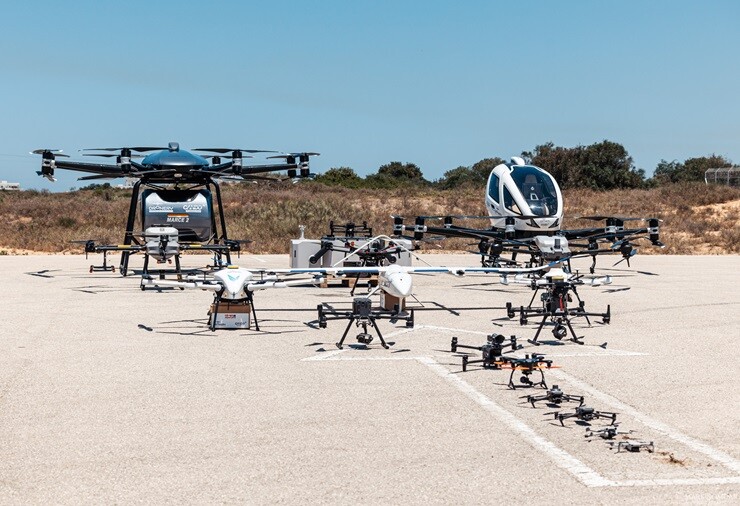For the last five years, we have been covering the amazing metamorphosis of the drone delivery business model, from a simple idea to take a package from a vendor to a consumer, to a complicated network of different vehicles, each covering just a section of the delivery route.
The fascinating issue of this upward evolution is that, in the process, the companies that have survived have developed an incredible array of technologies, both hardware and software, that suddenly fit into many other market niches.
A few weeks ago, we covered the introduction of a live monitoring of oil pipelines product by a drone delivery company in Ecuador. This week, we found out that another giant of the drone delivery industry, Speedbird has entered into a partnership with Israeli company Cando Drones, and High Lander Aviation, a global provider of UAS fleet management and uncrewed traffic management software, to offer a security solution.
 The resulting company is called BIRDS, and we had the privilege of talking to Manoel Coelhos, CEO of Speedbird, and Leo Szterenzys CEO of BIRDS to better understand how these three totally different enterprises combine to produce a unique product offering.
The resulting company is called BIRDS, and we had the privilege of talking to Manoel Coelhos, CEO of Speedbird, and Leo Szterenzys CEO of BIRDS to better understand how these three totally different enterprises combine to produce a unique product offering.
“I am proud to lead a company that stands to revolutionize the security industry in Brazil,” said Leo. “BIRDS is a new concept in aerial security. We will build security systems from the ground up, tailored to our clients’ needs, using the very best hardware and autonomous software to provide 24/7 coverage to facilities of all sizes. Drawing upon the expertise of three of the world’s leading UAS companies, we are able to offer a package that is truly unprecedented.”
Analyzing the technical capabilities of the three companies we can conclude that Cando Drones has established an amazing reputation in Israel for reliable aircraft and a solid process for autonomous uncrewed flying, while Speedbird is transforming the way packages are delivered in over ten countries and High Lander brings to the table its amazing UTM (uncrewed traffic management) technology and its integrated command centers powered by Orion DFM drone fleet management software solution.
With these combined capabilities customers have direct operation of UAS fleets of any size from the dashboard, as well as autonomous patrols and sensor-triggered dispatch. Features provided by the platform include live feed sharing, AI-powered object detection and tracking, precision landing, payload control, collision avoidance mechanisms and more.
“As the first UAS delivery company in Latin America and foremost UAS manufacturer in Brazil, Speedbird Aero brings unique expertise to this project,” Manoel stated. “We have years of experience operating in the Brazilian airspace and in-depth knowledge of the Brazilian market. As such, we can say for sure that BIRDS is more than an exciting new project - it’s the beginning of a new era in security services in Brazil, and the wider LATAM region in the very near future.”
The main concern when launching a new airborne business model is how its processes and technologies adapt to the local civil aviation authority.
“The BIRDS security package includes regulatory support and the necessary tools to navigate the highly developed airspace regulations of Brazil’s National Civil Aviation Authority (ANAC) and Department of Airspace Control (DECEA),” said Leo. “This complicated set of regulations have always been one of the key challenges for UAS operations companies in Brazil, but for clients of BIRDS this will not be a concern, its security systems will remain coordinated with aviation regulations and the law, thanks to the local knowledge and connections of Speedbird Aero. Furthermore, all operations executed with BIRDS will occur under the oversight of Vega UTM, an autonomous uncrewed traffic management solution that provides a suite of services enabling the management of remotely piloted aircraft at all scales and in the most complex of airspace. Extensively field-tested and compliant with all leading international standards - and with proven experience of emergency management of UAS nationwide - Vega connects between operators and authorities to ensure safety and full regulatory compliance.”
Brazil is the eighth largest economy and the seventh largest country by population and its explosive growth of late has created a series of security challenges that have to be covered with technology in order to stay competitive. Selecting which markets to target first was the first order of business for the BIRDS leadership team.
“BIRDS has developed an implementation package that enables even the largest organizations to implement UAS security technology with no interruption to their day-to-day operations,” said Leo. “The process begins with consultation and in-depth analysis of an organization’s needs and available resources. BIRDS will then supply the decided-upon hardware, or work with the hardware already in the organization’s stock. Finally, BIRDS will supply UAS pilots and command center operatives to run the security system on behalf of the organization - or if the organization prefers to operate the system in-house, BIRDS can provide full training courses for the clients’ employees.”
When asked about the perceived departure from Speedbird core business, Manoel offered a plausible and simple explanation: “When we looked at the tools that were necessary to launch BIRDS successfully, we found a 90% to 95% technological overlap, and at those levels, it was impossible to justify waiting to sign the alliance and launch the new venture.
In other words, the drone delivery model does it again; transforming a series of technologies and processes that were designed to deliver packages from Point A to Point B and quickly and effectively adapting them to pursue a different set of customers and goals but maintaining the reliability of the original intent. Well done!















Comments